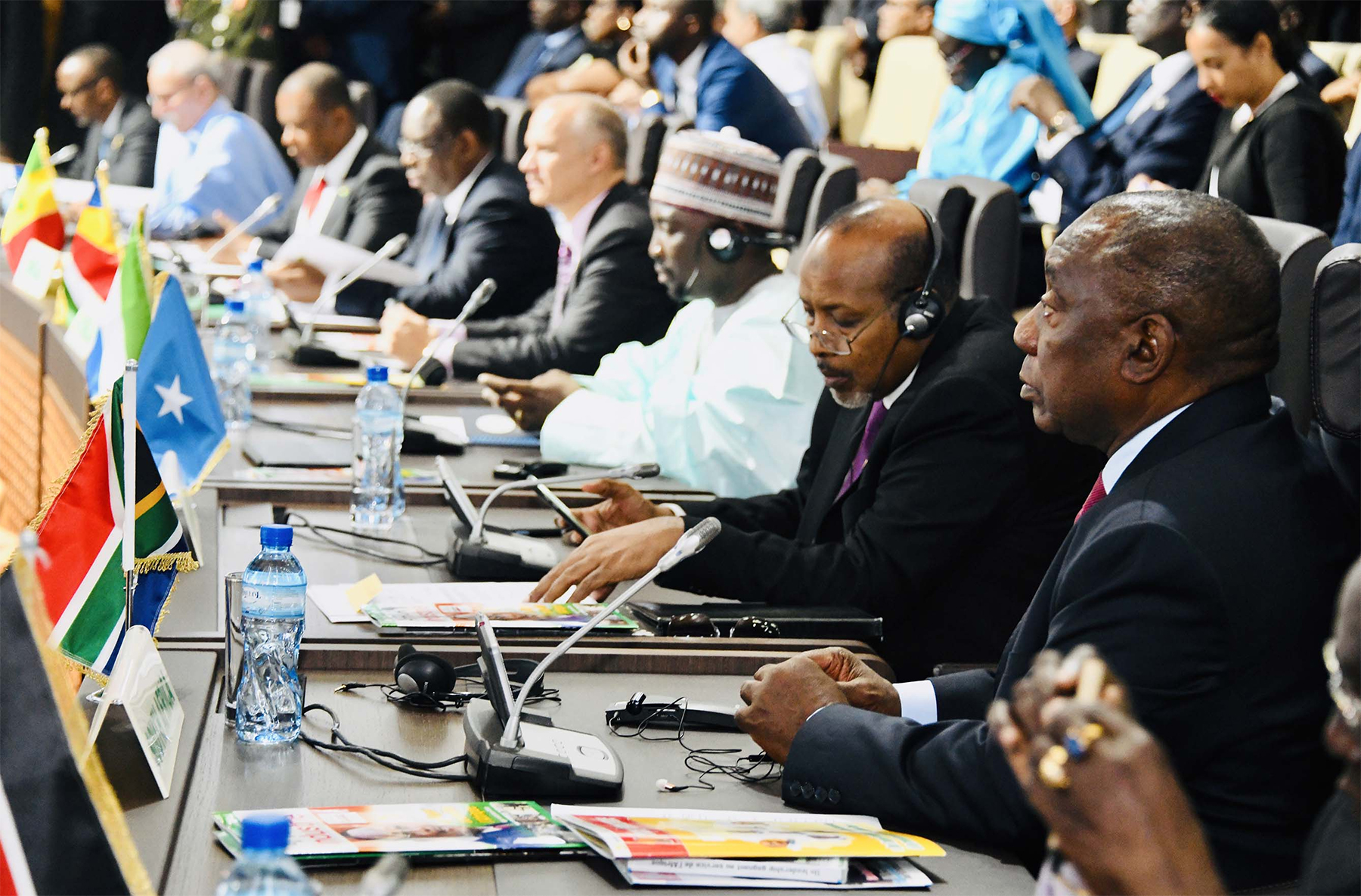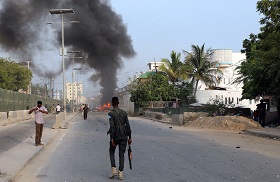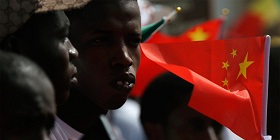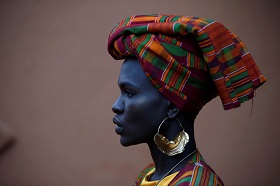In 2012, Hassan Sheikh Mohamud was elected as the first democratic leader of Somalia in more than 20 years. Having been one of the few Somali intellectuals to remain in the country throughout the entire civil war, Mr. Mohamud’s victory was not based on clan politics, but rather on respect for his work in civil society and education. Reputed on the African continent for resolving often dangerous clan disputes, Mr. Mohamud is now the Chairman of Somalia’s largest political aggregation party, the Union for Peace and Development Party, which has the majority in both chambers of parliament. In an exclusive interview for the RIAC, he spoke of African unity, Somalia’s road to peace and his vision of a prosperous future for his country.
In 2012, Hassan Sheikh Mohamud was elected as the first democratic leader of Somalia in more than 20 years. Having been one of the few Somali intellectuals to remain in the country throughout the entire civil war, Mr. Mohamud’s victory was not based on clan politics, but rather on respect for his work in civil society and education. Reputed on the African continent for resolving often dangerous clan disputes, Mr. Mohamud is now the chairman of Somalia’s largest political aggregation party, the Union for Peace and Development Party, which has the majority in both chambers of parliament. In an exclusive interview for the RIAC, he spoke of African unity, Somalia’s road to peace and his vision of a prosperous future for his country.
Mr. Mohamud, please tell us about the current social, political and economic situation in Somalia.
Somalia has found itself in a rather difficult situation for the last three decades. The civil war ended a long time ago, and while some degree of social reconciliation has been achieved since then, our current political situation remains fragile.
The presidential term in Somalia is four years, so I was in office from 2012 to early 2017. With the collapse of our state in 1990, Somalia was plunged into civil war until 2000. From 2000 to 2012 a transitional government was in place, I became the country’s first constitutional leader in more than 20 years and the second president in the history of the country to complete their term. After that, in 2017, Somalia’s second constitutional government took office, with its term set to end late 2020. We are slowly moving forward, but the reality is that we need time to increase political stability.
Somalia’s economy is considered informal, there’s no manufacturing sector and economic infrastructure is in poor shape. Lack of stability and security has drastically affected economic development. There hasn’t been any significant foreign direct investment until now due to security fears. Al-Shabab, amongst other terrorist groups, is a serious problem not only in Somalia but in the whole region. Despite that, the Somalia diaspora, which is estimated at about 2 million people globally, actively invests in the country. They are the lifeline of the economy today. Investment is directed into the service sector, including the rapidly developing telecommunications sector, banking system and tourist facilities, including hotels and other forms of infrastructure. Potential for enhanced economic development is evident, but security issues hinder such progress.
In terms of natural resources, Somalia has the longest coastline of the African continent, more than 3000 km, which means huge potential of our fishing industry. Apart from that, livestock has always been a primary economic export factor. Natural and mineral resources, particularly oil and gas, have been found offshore and onshore most recently. These factors could all serve as additional investment opportunities.
In regard to politics, political parties are now in place and elections are to be held within the next two years. We now have a common vision for the country. I believe in a Somalia that is a viable state, that is politically stable and socially cohesive. That should be our objective - to form a country that lives in peace amongst itself and with its neighbors. We have made great efforts to develop that very clear vision for our country. We need to continue attracting investment and addressing evident security issues.
How do you envision Africa reducing dependency on foreign aid and gaining independence through international support?
First of all, the basic problem and fundamental root cause of many issues faced by the African continent is poor governance. Africa has not yet succeeded in building a stable state that is locally owned. Since the post-colonial era, we have been realizing visions for the continent developed by the rest of the world and not by Africans themselves. African countries and communities need to acknowledge their common goals and develop local standards, expectations and a unified vision that are both sustainable and accepted nationally and by the continent as a whole. In addition, these ideas should be based on the distinctive cultures and social values of each country. I truly believe this is the only way Africa can develop. In the 1960s and ’70s, when many African states gained independence, multiple military coups and revolutions shook the continent. The 1980s and ’90s were marked by state failures that left an indelible mark on African history. East African countries, in particular, Somalia, Kenya, and Ethiopia are still dealing with an imminent terrorist threat. West Africa, unfortunately, is no exception, with the likes of Burkina Faso and Niger affected by extremist activity. I see this as another phase of Africa’s fight for its own existence.
Nonetheless, it is globally acknowledged that Africa is a very rich continent. However, we need to become more than just a source of raw materials by developing the manufacturing sector. Initiatives such as the AfCFTA are being further developed and need time to come into effect and create tangible results.
There is a lot of debate today on the continent about the dark side of foreign aid and the extraction of resources by Western countries or companies. The time has come for Africans to form new partnerships, start doing business amongst themselves, find effective solutions for political problems, create viable states, develop infrastructure and build human capital. The new African vision leaves no room for illicit trade and corruption. These are all new philosophies that we are working on together, as a continent.
Please speak of what Africa can offer the world today. What makes Somalia special as a growing economy?
Many of the fastest developing economies in the world today are African. More than 70% of our population is under 30, we are rich in mineral resources and we now have a market of more than a billion people. If the infrastructure is further developed, political stability is gained and trade and economic barriers are dismantled, Africa has a lot to offer the world. I am speaking about a lot more than just raw materials and manpower. Somalia has a well-functioning telecommunications industry in terms of quality and price. Internet is available 24 hours, as well as telephone lines even in the most remote villages. Electricity is returning to many regions. The field is privately managed, which differentiates the industry from those in many other countries. Apart from that, we currently have one of the lowest inflation rates on the continent.
During your opening statement at the 2015 India-Africa Forum Summit, you mentioned, "While our state might have infamously failed in the past leading to difficult times, our country and our people never failed." Please comment on Somalia's national identity, why you chose to stay in the country over the course of the civil war and how your experience affected the decisions you made as the country's first democratic leader after the war.
Our state did fail, but our people never did. I’ll refer to several examples as paramounts. In almost 30 years of state failure, collapse, fragility, and civil war, nothing similar to the Rwandan genocide ever happened. International law and various traditional norms were respected, children, women, and elders were never directly targeted.
Regarding national identity, Somalis are homogenous, we all belong to one ethnic group called Somalis. The first key pillar of our national identity is the Somali language, one of the four cross-border African languages. Although we have clans, tribes and social divisions, all Somalis speak one language. The second pillar is the religion of Islam. There are no minority religions in Somalia today. Even though the concept of clans might be foreign to other cultures, those shared elements, our common ethnic group, language, and religion are critical to our sense of national unity.
Over the course of the civil war, the idea of a common identity saved many people. Despite our history and the obstacles faced over the last, very painful 30 years, we have the potential to become a democratic state. The responsibility to make that happen fully lies on us, the Somali people. We have been the recipients of colossal support that was not necessarily based on the real needs of our people. At some point, Somalia found itself in special circumstances that made many global development goals unattainable for the country. The international community invested a lot into human rights protection in Somalia by training and capacity building for local human rights groups. Despite the nobility of the work being done, human rights simply cannot be guaranteed when there is no rule of law and chaos on a national level.
Another issue is food handouts, which encourage dependency on further aid, instead of promoting local agricultural development. Somalis can and should produce their own food, especially considering the resources we have access to. We have rivers and underground water supplies that would allow for successful irrigation. Somalia needs neither food handouts nor foreign advocacy for human rights. Freedom is not possible without the rule of law. For that to happen, we need state programs and local initiatives. It is all about the global community helping Somalia help itself.
Mr. Mohamud, please say a few words on the potential of a Russian-Somali partnership.
Somalia had a good working relationship with the Soviet Union, but many people in Somalia today have trouble distinguishing modern Russia from the former USSR. A significant portion of the country’s intellectual elite studied in Russia and, therefore, speak the language and understand the culture. Sadly, that generation is growing older and far fewer Somali youth pursue degrees in Russia today. Currently, the perception of Russia is positive, largely thanks to Russia’s neutral stance in regards to Somali politics. Many Western countries have interfered in one way or another, be it positive or negative. There are certain perceptions amongst our people that the West isn’t interested in a strong Somalia or that the world stands to gain from Somalia’s weakness. Whether these perceptions are right or wrong is another matter, but they do not relate to Russia that always maintained a neutral stance in regard to our politics.
I look forward to Somalia and Russia boosting cooperation. There are many opportunities for economic cooperation between our countries and the knowledge, technical know-how and capacity of the Russian Federation could be a true asset in our partnership.
Interviewed by Lora Chkoniya, RIAC Expert









